Top 100 players of 2014: Nos. 10-1
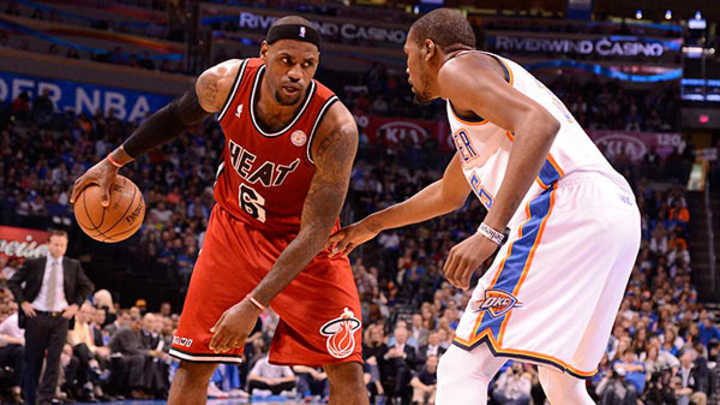
The NBA's top two players, LeBron James and Kevin Durant, are in a league of their own. (Greg Nelson/SI)

After a meandering list of also-rans and runners-up, the top 10 has finally arrived.
The Point Forward is proud to offer up the final installment of our top 100 players in the NBA — an exhaustive exercise that sought to define who will be the best players in the 2013-14 season.
Given the wide variety of players involved and the deep analytical resources available, no single, definitive criterion was used to form this list. Instead, rankings were assigned based on a fluid combination of subjective assessment and objective data. Future prospects beyond this season did not play a part in the ranking process, while the influence of team context was minimized to whatever extent was possible. Our sole concern was how players are likely to perform this season alone. For more on the limitations of this exercise, take a quick detour here. For notable omissions, click here.
In case you missed them, here's our rankings from Nos. 100-1:
Monday: Nos. 100-51
Tuesday: 50-31
Wednesday: 30-21
Thursday: 20-11
Today: 10-1 (below)
A quick introduction for those not familiar with some of the “advanced” statistical measures used below:
PER (Player Efficiency Rating) – PER is a per-minute summary of a player’s efficiency and performance, weighted so that a league-average player registers a 15. It generally skews in favor of big men and does not account for defensive contributions that don’t show up in the box score.
Win Shares – A metric that uses box score data to estimate the total number of wins a given player contributes. Last season, Win Shares ran on a scale of -1.5 (Michael Beasley) to 19.3 (LeBron James), but only 10 players finished with more than 10.
RAPM (Regularized adjusted plus-minus) — A variation of plus-minus that compares the on-court impact of every NBA player to a league-average standard (0). The adjustment helps account for much of the statistical noise that exists in raw plus-minus measures.
10. Carmelo Anthony, New York Knicks (F, 29)
2012-13 stats: 37 MPG, 28.7 PPG, 6.9 RPG, 2.6 APG, 44.9 FG%, 37.9 3FG%
2012-13 advanced stats: 24.8 PER, 9.5 Win Shares, +2.3 RAPM
Anthony’s move to New York in 2011 put him on a much larger stage, serving to escalate the passionate debate that’s long raged between his supporters and detractors. It's unclear whether the terms of that debate have meaningfully shifted, even after a season in which the Knicks won their first playoff series since 2000 and Anthony become the only player besides LeBron James to receive a first-place MVP vote. Yes, Anthony led the league in scoring for the first time in his career, he registered a career-high PER that ranked No. 4 in the league, and he earned All-Star and All-NBA Second Team honors. And, yes, the Knicks, designed to make the most of Anthony’s strengths, ranked No. 3 in offensive efficiency.
GALLERY: Top Top 100 NBA players of 2014
But the biggest recent developments in Anthony’s game — his use as both a three and a four, and the increased frequency with which he launches three-pointers — seem to be positive wrinkles rather than quantum leaps. Look, it’s tough and unfair to compare anyone to James, but that’s always been the standard for Anthony. The two came into the NBA in the same draft class, they play the same position, and Anthony has publicly declared his desire to win a title, something James has now delivered twice. Here’s a snapshot look at their statistical developments as they have progressed through their twenties.
Anthony
Age 22: 28.9 PPG, 22.4 FGA, 47.6 FG%, 26.8 3FG%, 6 RPG, 3.8 APG, 22.1 PER, 7.3 Win Shares
Age 25: 28.2 PPG, 21.8 FGA, 45.8 FG%, 31.6 3FG%, 6.6 RPG, 3.2 APG, 22.2 PER, 7.9 Win Shares
Age 28: 28.7 PPG, 22.2 FGA, 44.9 FG%, 37.9 3FG%, 6.9 RPG, 2.6 APG, 24.8 PER, 9.5 Win Shares
James
Age 22: 27.3 PPG, 20.8 FGA, 47.6 FG%, 31.9 3FG%, 6.7 RPG, 6 APG, 24.5 PER, 13.7 Win Shares
Age 25: 29.7 PPG, 20.1 FGA, 50.3 FG%, 33.3 3FG%, 7.3 RPG, 8.6 APG, 31.1 PER, 18.5 Win Shares
Age 28: 26.8 PPG, 17.8 FGA, 56.4 FG%, 40.6 3FG%, 8 RPG, 7.3 APG, 31.6 PER, 19.3 Win Shares
With James, you see a true evolution, especially during his Miami period. With Anthony, the story has been one of mere consistency, plus some improvement as a three-point shooter that’s bumped up his advanced numbers a touch. James has transformed into the most lethal, efficient weapon in the game; Anthony has seemingly become a slightly better version of himself, and his stagnant, unimpressive defensive ratings and his wavering plus-minus numbers over the years only reinforce this conclusion. New York’s impressive team defensive performance in 2011-12 didn’t stick; neither did Anthony’s one-year improvement as a distributor that season.
Anthony, then, is more or less the same player that he’s been for the last half-decade. He shoots a lot, scores a lot, makes baskets in many different ways and from many different locations, draws lots of fouls and defensive attention, and he rebounds well for his position. He isn’t excactly in James’ class when it comes to lockdown defense on opposing wings and he's definitely no Rajon Rondo when it comes to sharing the rock.
Indeed, Anthony led the NBA with his 35.6 usage rate, which marked a career-high. He also posted his lowest assist total of his career and a 14.1 assist percentage, his lowest mark since 2005. That combination of an extraordinarily high usage rate and a middling assist rate puts Anthony among the greatest black holes the NBA has ever seen. Only two other players — George Gervin in 1982 and Dominique Wilkins in 1988 — have used such a large share of possessions while registering such a low assist rate. For comparison, Kobe Bryant, notorious for his ball-dominating ways, hasn’t posted an assist percentage below 22 since 1999. Sorry, Anthony’s “hockey assists” can’t explain this away.
Even those who wish Anthony would be a little less single-minded on offense, a little more selective with his shots, and way more committed on defense can acknowledge that he’s an overall offensive powerhouse capable of serving as the No. 1 guy on a championship contender, assuming the right mix is in place around him. Will Anthony ever find that right mix, or will James continue to lord over him like Michael Jordan did to so many of his talented contemporaries? -- Ben Golliver
9. Kobe Bryant, Los Angeles Lakers (G, 35)
2012-13 stats: 38.6 MPG, 27.3 PPG, 6 APG, 5.6 RPG, 1.4 SPG, 46.3 FG%, 32.4 3FG%
2012-13 advanced stats: 23 PER, 10.9 Win Shares, +3.2 RAPM
"Bryant, 35, suffered a season-ending Achilles injury in April and his return date is unclear."
That is the mandatory first sentence of every discussion about L.A.'s living legend this fall, a sentence that reflects Bryant's advancing age, the severity of his injury and the reality of his future, three factors that make it exceedingly difficult to place him in the Top 10, let alone the top 100. Throw in the Lakers' loss of Dwight Howard to the Rockets, and Bryant joins Rajon Rondo (knee injury and rebuilding team) and Andrew Bynum (knee injuries and new team this summer) as the toughest guys to peg. So why did Bryant, unlike the other two, hold a spot near the very top of this list?
The answer is a combination of the following factors: Bryant, had an extraordinary individual season in 2012-13, he has a near-mythical ability to play through pain and recover from injuries, and his track record of excellence is so damn long that it demands an extra level of respect and benefit of the doubt. Is it reasonable to assume a player like James Harden (No. 11 on this list), fully healthy and a full decade younger than Bryant, will move past him on the 2015 version of this list? Absolutely. Does it feel wrong to make that call right now without seeing what Bryant looks like this year? It does. It's one thing to move Dwyane Wade -- a three-time champion and nine-time All-Star -- past Bryant. But Harden, a one-time All-Star with 85 career starts and a lackluster playoff résumé? Not yet. Soon, but not yet.
L.A.'s 2012-13 season was a mess, in large part because a functional relationship between Bryant and Howard just never materialized. Bryant wasn't about to accommodate anyone, and Howard didn't -- couldn't, really -- possess the cachet to fully assert himself. What that left Lakers fans with was an up-and-down year, a furious finish, a fast playoff exit and one absolutely incredible campaign from Bryant. Only one man has matched Bryant's PER and scoring average during his age-34 season: Michael Jordan. That Jordan accomplished this feat in 1997-98 and then immediately retired for the second time will surely fuel those who believe Bryant's best days are behind him. Foreboding comparison aside, Bryant's PER ranked in the top 10 overall and No. 2 among two guards, his Win Shares ranked No. 8 overall and No. 2 among two guards, and he earned All-Star and All-NBA First Team honors. In his last 22 games (not including a brief appearance against the Pacers when he tried to come back early from an ankle injury), Bryant averaged 30.4 points, 7.3 assists and 6.4 rebounds and the Lakers went 15-7 to squeeze into the playoff picture. It was a three-week tour de force that served as yet another reminder of why Bryant is so feared and revered by his fellow NBA players.
Defense is a different story. Although he clearly trails Wade in that department, Bryant escaped with a +2.7 net rating and a top-40 RAPM thanks to his top-shelf contributions on offense. The departure of Howard and Metta World Peace, L.A.'s two best defenders in 2012-13, will surely make Bryant's frequent and obvious defensive breakdowns that much more debilitating. Bryant has flirted with the idea of retirement in recent years but he's also been adamant about getting back onto the court following the Achilles injury, and he's talked openly about his next contract negotiation too. Whenever the time does come for retirement, it will likely be because Bryant can no longer conjure up the scoring magic needed to overcome his lackluster and occasionally lost defense. -- B.G.
http://youtu.be/jhyANGHDDH8
8. Dwyane Wade, Miami Heat (G, 31)
2012-13 stats: 34.7 MPG, 21. PPG, 5.1 APG, 5 RPG, 1.9 SPG, 52.1 FG%, 25.8 3FG%
2012-13 advanced stats: 24 PER, 9.6 Win Shares, +4.5 RAPM
It's always a bit odd to me when Wade is characterized as a secondary creator, as if playing with LeBron James made him something less of a superstar. With Miami, traditional hierarchy models need not apply; while James may take the lead for the Heat in many regards, Wade attempts all of two fewer shots per game while ranking in the league's top 10 in usage rate. Ultimately, he uses more possessions than the first-option player on 26 of the league's teams -- a relative standing that reinforces his co-ownership of all that the Heat accomplish.
Durant: Harden, not Wade, belongs in SI's Top 10
If James takes over, it's because he has to; Wade has been hit with recurring knee injuries during each of Miami's championship runs, and with those injuries come pretty clear limitations. Wade has managed to put up some strong all-around numbers (4.8 assists and 4.6 rebounds per game in the 2013 playoffs, just a tick below his season averages) in spite of that, but clearly lacked the ability to properly exploit defenders who wandered away to help against James or others. It's a misleading sight for those who only tune in for the playoffs, as the postseason framing of a hobbled Wade omits so much of what makes him great.
He remains one of the league's very best slashers, strong and long enough to overwhelm most of the players unfortunate enough to draw his assignment. That tall task begins with trying to make sense of Wade's arrhythmic dribble. There are great scorers who manage to get by without much ball-handling creativity, but Wade toys with the cadence of his bounce as a means of manipulating his defender's expectations. Every burst or hesitation is a prompt, intended to induce a particular reaction and capitalize on it simultaneously. Even 10 years of scouting doesn't much help Wade's opponents from looking foolish, as he lulls them into overcommitting in one direction only to easily spin to the other.
The footwork involved in pulling off those drives also need be impeccable, as Wade has to both sell his defender on a particular fake while nonverbally convincing game officials of his move's legality. It's natural basketball instinct to call foul on that which seems peculiar, and on those grounds alone Wade might be wrongly whistled for more non-travels than any player in the league. He also gets away with a fair bit by virtue of being Dwyane Wade, though, so we'll call it even on balance.
Wade uses his driving ability as a means to create for others, too, and has fared remarkably well as a dominant creator when James leaves the floor. While it should go without saying that Miami is at its best with both of its core stars complementing one another, last season Wade led LeBron-less Heat lineups to score at a rate of 108.1 points per 100 possessions, per NBA Wowy -- a mark that would have ranked third in the entire league if cast as a season average. That's a remarkable level of offensive success for a team playing without its best player, accomplished largely because Wade still generates offense at an incredible level while managing career-best shooting efficiency.
Also working in Wade's favor: He's one of the few high-level shooting guards on our list that plays a lick of defense. Wade might be guilty of lightly jogging back down the floor when he should be defending in transition, but otherwise he's an essential piece of one of the league's more unique breeds of coverage. Miami asks a lot of its wing players, if only because they're capable. In Wade's case, that translates to an inordinate amount of help relative to what you might see elsewhere around the league, much of which requires him to body up much bigger players in order to buy time or protect the rim. In that regard, Wade is a legitimate game-changer; his uncanny shot blocking ability makes him wholly unique among guards, while his physical profile empowers him to carry out the full mandates of Erik Spoelstra's system.
That makes for a decisive advantage over Bryant, who seemingly goes out of his way to be a destructive defender, and Harden, who couldn't be bothered to play much honest D last season. Wade has his quirks on that end, too (he's prone to gambling, can struggle to keep up laterally when injured, etc.), though overall he's such a unique asset on that end of the floor as to redeem consistent and legitimate value. -- Rob Mahoney
http://youtu.be/pjkRwRmWpH8
7. Dwight Howard, Houston Rockets (C, 27)
2012-13 stats: 35.8 MPG, 17.1 PPG, 12.4 RPG, 2.4 BPG, 1.4 APG, 1.1 SPG, 57.8 FG%
2012-13 advanced stats: 19.4 PER, 7.6 Win Shares, +5.5 RAPM
Here's where things get really dicey. We have in the midst of our top 10 two bigs well worthy of a favorable ranking, and yet by definition one must outdo the other. By way of this countdown, you already know the result of that comparison; Howard comes in at No. 7 while Tim Duncan has yet to be ranked, thus marking this a victory in favor of an all-time great and a notable loss for lovers of fart jokes everywhere.
That said, I don't know that I completely agree with our final determination here; Duncan is coming off of such a remarkable season (and has staved off his career descent so many times) that I won't dare complain, but I very much anticipate Howard reclaiming the spot as the league's preeminent center this season. Duncan will undoubtedly still be great, it's just a matter of two players going in opposite directions -- one doing his damnedest to prolong the inevitable, while the other rebounds from gross, extenuating circumstances.
It's crucial in this analysis to understand that last season's version of Dwight Howard was not the genuine article. He was hindered for most of the season by back and shoulder injuries -- ailments that limit range of motion and the application of athleticism. He was smothered by team and individual expectations that he struggled to meet as a result, and was thus prone to some pretty terrible body language. Howard also never had time to establish any kind of chemistry with his point guard; while Jameer Nelson was always an underrated part of Howard's success in Orlando, Steve Nash's own injuries rendered him an absentee playmaker. The Lakers' first head coach of the season (Mike Brown) was fired after only a few games, thus sending an already reeling team further into its tailspin. Howard had to then -- in a completely new system under Mike D'Antoni -- strike the proper balance in playing with Pau Gasol, acclimate himself to a new locker room, and learn to play with other superstars for the first time in his NBA career. He also had to figure out the best way to coexist with Kobe Bryant as both a player and a person, neither of which seems particularly simple.
Even a few of those complications would be tough to handle, but altogether they proved to be too much. Howard was physically hurt while clearly out of sorts, and he played as such. Yet he was still the Lakers' best defender by far, the team's second-leading scorer, and one of the top rebounders in the league. He just wasn't Dwight. The pain of Howard's season was borne of comparison to his own lofty standard -- those years of transformational defense and dominant offense that made last year look like a bungled mess by comparison.
It's fair to evaluate Howard against his own track record, though in this case I don't think it's necessarily prudent to hold all of last season against him. Tear into him for his inconsistent defensive effort, his still-baffling free throw shooting, or his odd reluctance to play more in the pick-and-roll. It just doesn't make much sense to hold him liable for all that went wrong with his and the Lakers' season, nor to overlook all of the complexities involved in his struggles.
Howard is still fundamentally one of the best in the league when healthy, capable of making an inimitable defensive impact and playing a huge offensive role. He just needed better health, better luck, and a better fit -- all of which he'll likely get in Houston. Whether he'll be good enough in his first year there to best Duncan is a fair point of debate, but I like his chances.
As good as Duncan was last season, peak-level Howard was decisively better. We can't yet know how close Howard might get to again achieving those highs, but at the least I think he stands to be one of the deadliest bigs in the league when on the move (even in a down year, Howard converted an ungodly 79.6 percent of his pick-and-roll possessions last season, per Synergy Sports), a solid post-up option, and a worthy defensive anchor. If he further approximates his best seasons to date, he'll be a clear-cut MVP candidate. Howard has the potential -- based in recovery, not in development -- to climb a rung above Duncan, and in that alone I think he has a compelling case. -- R.M.
6. Tim Duncan, San Antonio Spurs (C, 37)
2012-13 stats: 30.1 MPG, 17.8 PPG, 9.9 RPG, 2.7 APG, 2.7 BPG, 50.2 FG%
2012-13 advanced stats: 24.4 PER, 8.3 Win Shares, +7.3 RAPM
Get up. No, seriously. Get up. Whether you're in your cubicle, or on the bus, or in your living room, get up and give Duncan the standing ovation he deserves.
The initial reaction to seeing any big man ranked above Howard might lead to confusion and a desire to protest. That's understandable: as recently as 2011 Howard was the No. 2 player in the league and Duncan seemed just about read to exit stage left. In 2015, two years from now, it seems more likely than not that Howard will once again be regarded as a top-five overall player; at that point, Duncan will have reached the end of his current contract and will almost certainly be headed for retirement.
But let's not talk about 2011 or 2015. Let's talk about 2013, a season in which Duncan was the league's best big man, period. Duncan was the most important player on the NBA's third-rated defense and the second-leading scorer on the No. 7 offense. He earned All-NBA First Team, All-Defensive Second Team, and All-Star honors, and he finished sixth in Defensive Player of the Year voting. His PER ranked No. 6 in the league, his RAPM ranked fourth in the league, his individual defensive rating led the league, he boasted a gaudy +10.5 net rating (among the very best in the league), and he registered more blocks (183) than fouls (117). The only player to post a PER as high as Duncan's at this age was Karl Malone. Then, Duncan averaged 18.1 points, 10.2 rebounds and 1.6 blocks as he led San Antonio to a 15- 6 postseason record. In case you somehow forgot, he put up a whopping 30/17 Game 6 of the Finals, a stat line that only Shaquille O'Neal has matched in a Finals game since 1986. Duncan came within 5.2 seconds of his fifth NBA title and his fourth Finals MVP award. Let's say that again for emphasis: he came within about six inches on one Ray Allen three-pointer of beating out a 28-year-old, top-of-the-world LeBron James for Finals MVP. That's why you were asked to stand up and applaud at the opening of this section. (By the way, it's cool to sit down now.)
Could this be the season Duncan finally declines (and stays declined)? That's definitely a possibility, even though we've thought that before on numerous occasions. But if the choice here is to penalize Duncan for that possibility or to reward him for his historic season, that should be an easy one. Need more convincing? Compared to Howard, Duncan averaged more points, more assists and more blocks, less turnovers and less fouls, had a better PER, had a better Win Shares, had a better offensive rating, had a better defensive rating, and the Spurs totally outperformed the Lakers on defense while also ranking higher on offense. Duncan beat out Howard in All-NBA and All-Defensive and Defensive Player of the Year voting, and Duncan won more games against the Heat in the Finals (3) than Howard has won over the past three playoffs combined (2). You don't need Shaquille O'Neal to tell you that Duncan has a better all-around offensive game and a more refined defensive game than Howard, or that, in addition to this year's long playoff run, Duncan also went to the 2012 Western Conference finals.
The off-court comparison is even more lopsided: Duncan has consistently served as the pillar of the league's best organization over the last 15 years, getting the most out of stars and non-stars alike while not caring who gets the credit (and being showered with praise/credit by his Hall of Fame coach, Gregg Popovich). Howard has made a mess of two straight seasons, watched as two of his coaches were fired (Stan Van Gundy and Mike Brown), had friction with a third coach (Mike D'Antoni), had a GM cut loose (Otis Smith), snapped at another GM while being ejected from the playoffs (Mitch Kupchak), burned locker room bridges in both L.A. and Orlando, and failed to get along with stars and non-stars alike.
On the flip side, Howard averaged more rebounds and shot a higher percentage. So he's got that going for himself, which is nice.
Still not convinced Duncan should be above Howard? Ask yourself this: If both teams are fully healthy come playoff time, who would you pick in a Spurs/Rockets match-up? Which player, Duncan or Howard, do you trust to show up? -- B.G.
http://youtu.be/0uCTXqNIxoU
Playing alongside Kevin Durant, it's easy to forget just how great Russell Westbrook is. (Greg Nelson/SI)

5. Russell Westbrook, Oklahoma City Thunder (G, 24)
2012-13 stats: 34.9 MPG, 23.2 PPG, 7.4 APG, 5.2 RPG, 1.8 SPG, 43.8 FG%, 32.3 3FG%
2012-13 advanced stats: 23.9 PER, 11.6 Win Shares, +5.3 RAPM
Russell Westbrook is a man of violence. His style is punishing by its very nature, as he hurtles himself into the teeth of opposing defenses and aims clearly to crush all that stand in his path. While other superstars play with a charismatic bounce in their step, Westbrook's sensibility hinges on a certain haine de vivre -- a competitive malevolence that brings him to stare down the best in the league and, by opposing, end them.
He's routinely slammed for his attitude, his recklessness, and his impurity as a point guard. Westbrook doesn't much fit the conventional mold of what a ball handler should be, and in that is seen to take away opportunities and shot from Kevin Durant. Yet their balance is essential to the Thunder's success; Westbrook might be aggressively unpredictable, but he's become a creative, productive force all his own.
Much of that stems from the fact that Westbrook is almost impossible to stay in front of. He works from a foundation of exhilarating athleticism, the class of which allows him to buzz past the first line and command the attention of the entire opposing defense. Even then, he can't often be stopped; Westbrook averaged more field goal attempts in the restricted area (6.9) than any other guard in the NBA last season, and managed to leverage his drives to create contact and earn free throws with incredible frequency. All of this tends to make his rushes of pull-up jumpers that much more befuddling. Westbrook has the skill and body control to hit that shot somewhat consistently, but his explosive drives grant him the potential to to do better. He's a bit wiser, now, about picking his spots with those jumpers, just as he's lowered his turnover rate to career-best levels through more precise passing. But Westbrook certainly isn't without his vices, and those aspects of his game can occasionally be overwhelming.
Yet the Thunder happily live with those wilder patches for the sake of employing a shot-creating dynamo. In addition to manufacturing his own offense at an elite level, Westbrook is also the key to unlocking Oklahoma City's limited bigs as offensive threats. Never was that more evident than in the 2013 playoffs, where Westbrook's brutally timed meniscus tear forced Serge Ibaka, in particular, to go without. Predictably, Ibaka's scoring efficiency suffered; the once-viable scorer converted just 37.7 percent of his field goals in the Thunder's second-round series against the Grizzlies, as he sorely missed the easy opportunities that Westbrook's drives yield. During the regular season, that factor alone made all the difference for Ibaka, who converted a terrific 58.8 percent of his field goals when sharing the court with Westbrook, and a dim 40.3 percent* when operating otherwise (though to be fair, Ibaka only played 194 minutes without Westbrook during the regular season).
Ultimately, Westbrook was responsible for setting up nearly 40 percent of the baskets scored by Ibaka and Kendrick Perkins -- two players who otherwise have a terribly rough go of getting the ball in the hoop. That may well be basketball creation in its purest form, manifest in the game of a somewhat spotty playmaker.
Westbrook may not ever have the full control that empowers the two point guards that outrank him here, but to what extent that really matters is negotiable. At present, he's already in a dead-tie with Parker at the least -- nudged down ever so slightly in light of his meniscus tear (which isn't expected to hold him back, but stranger things have happened) and Parker's incredibly successful postseason. Otherwise, Westbrook's volcanic game stacks up with the finest at his position. He compensates for his weaknesses (iffy shooting percentages, shaky playmaking judgment, lack of defensive discipline) by regularly accomplishing the extraordinary, and in that offers a unique, catalytic influence. -- R.M.
http://youtu.be/X42udSG_HB0
4. Tony Parker, San Antonio Spurs (G, 31)
2012-13 stats: 32.9 MPG, 20.3 PPG, 7.6 APG, 3 RPG, 52.2 FG%, 35.3 3FG%
2012-13 advanced stats: 23 PER, 9.3 Win Shares, +3.3 RAPM
Coming to a consensus ranking on Parker was tricky for a couple of reasons. First, should he be above Duncan? Who is more indispensable to the Spurs? Would a Duncan-less team go further in the postseason than a Parker-less team? Can you you even imagine a Spurs team without either of them after this past season/postseason? Second, where does Parker fall in the ultra-competitive point guard hierarchy? How do you really define "better" between Parker, Westbrook and Chris Paul (and Derrick Rose when he's healthy)? Parker is the oldest and by far the most accomplished from a team perspective (three rings, one Finals MVP), but he's not the most complete, or the most athletic, or the most-decorated from an individual standpoint.
Unintentionally, Parker's relative ranking here mirrors the results of the 2013 MVP voting. Parker finished sixth on that ballot, one spot ahead of Duncan, and second to Paul among point guards. This ranking might not please everyone but it does seem fair. Parker was the leading scorer and the leading assist man on an offense that has ranked No. 7 in 2013, No. 2 during the 2013 playoffs, No. 1 in 2012 and No. 2 during the 2012 playoffs. His quickness, poise, decision-making, natural distribution instincts, and his ability to get to the hoop seemingly at will combine to make him the engine behind San Antonio's spectacular attack. During the Spurs' 2013 run to the Finals, Parker beat the Warriors with his scoring (32 points in a key Game 3 win on the road), he beat the Grizzlies with both his passing (18 assists in a Game 2 win) and his scoring (37 points in a closeout Game 4 on the road), and he beat the Heat with pure ingenuity (his magical Game 1 winner). Parker's shaky health during the Finals is one of the many laments that San Antonio fans were left with following the soul-crushing series defeat. If Paker delivers an "A" night in either Game 6 or Game 7, the Spurs go back to Texas as champions.
Numbers-wise, 2012-13 was among the best years of Parker's career, from both the standard and advanced perspectives. He put up the second-best scoring and assist figures of his career and his overall shooting percentage was the second-best of his career. His PER was also near career-high levels and it ranked No. 3 among point guards (behind Paul and Westbrook). His Win Shares -- adjusted for minutes played -- ranked No. 5 overall and No. 2 among point guards (behind Paul). His +10.7 net rating trailed Westbrook but topped Paul; same thing with his +6.8 plus/minus. When it comes to RAPM, Paul placed well above both Westbrook and Parker. From a team perspective, Parker's Spurs finished with 58 wins: less than Westbrook's Thunder but more than Paul's Clippers.
Take all of that together and this winds up being hair-splitting of the highest order. Paul's individual credentials, in sum, appear to be the best of the three, even if he's had the least amount of team success. That individual edge -- in overall, offensive and defensive numbers -- was enough to give Paul the nod in our final order. Westbrook finished third among the three in part because he's coming off of a minor knee surgery. The lasting thought here should be that this is a race so tight that it will be re-fought every year for the foreseeable future. -- B.G.
http://youtu.be/UkMGrDuItY8
3. Chris Paul, Los Angeles Clippers (G, 28)
2012-13 stats: 33.4 MPG, 16.9 PPG, 9.7 APG, 3.7 RPG, 2.4 SPG, 48.1 FG%, 32.8 3FG%
2012-13 advanced stats: 26.4 PER, 13.9 Win Shares, +8.2 RAPM
This spot isn't quite as iron-clad as the two that follow, but Paul has nonetheless made a rather firm claim to NBA bronze. He's truly a master of his craft; Paul plays with his finger on the pulse of the game, and impeccably walks the line between scorer and facilitator. He always has a firm grasp of what it is that his team needs, and unlike other, elite guards with high basketball IQ, Paul has both the quickness and skill to provide.
Even the most basic passes are elevated by Paul's touch, as every kick-out or drop-off is delivered with perfect placement and timing. Yet beyond that, he manages the seemingly impossible by way of his command off the dribble. While Paul benefits from an almost supernatural court vision, he's also able to eke passes through tight quarters by firing them off quickly with one hand. By the saving the time it would otherwise take to put two hands on the ball, Paul is able to capitalize on tiny, closing windows without much risk of defensive intrusion. Other great point guards have employed the same technique, but Paul's one-armed feeds can be absurdly zippy considering the microsecond release and nonexistent wind-up involved.
Such passing efforts are surely aided by Paul's outstanding shooting from everywhere inside the arc -- a universal effectiveness that causes defenses to crumble from the inside. Once Paul begins to penetrate off the dribble -- a frequent occurrence given his incredible one-on-one game -- several defenders are often at his whim. He goes to amazing lengths in denying his man the opportunity to recover; after beating his defender (or shedding him in the pick-and-roll), Paul essentially boxes him out the rest of the way -- never letting him resume front-side position, and thus requiring the help of other defenders at virtually all times. That approach opens up all kinds of fascinating avenues for Paul to explore, particularly as a member of the Clippers. Playing with consistent lob threats is a perfect canvas to showcase Paul's creativity, and he manages to pull the attention of opposing bigs for just long enough to fire up a clean shot to a hovering Blake Griffin or DeAndre Jordan.
By getting so deep into the paint and warranting so much attention, Paul tests the discipline of every opposing defender he encounters. Most tend to buckle at some point, given that they'd rather not concede an open jumper or layup to a poised, willing scorer. As a result, Paul often sees the floor open up for him the longer he loiters in and around the paint -- thus providing a perfect vehicle for his playmaking talents. With such compromise comes quality shots; not only was Paul able to create open looks for himself and get to the basket consistently, but per Hoopdata he ranked second in the league last season in assists leading to both shots at the rim and beyond the three-point arc.
He's an orchestrator of the highest order, and his influence bears out in the Clippers' performance. Even with capable backup guards behind him last season in Eric Bledsoe and Jamal Crawford, Paul's presence on the floor translated to an offensive difference of 10.8 points per 100 possessions -- the margin between a league-best defense and one of the five worst. That's the magnitude of in play with a star of Paul's magnitude, to say nothing of what he brings to the table as a crafty, aggravating defender.
There's no room this high in our ranking for anything short of a two-way player, and Paul's fiery disposition and incredibly active hands allow him hold his own in most any matchup. He can be dwarfed in size or overpowered by bigger guards, but -- as he tends to in every aspect of his game -- Paul finds a way. He claws, he pushes, he smothers, and ultimately he provides a furious front-line option to help halt opposing ball handlers at the top of the floor. Such determined, aggressive coverage isn't without its risks, but that Paul so consistently victimize his opponents only enhances his overall value. -- R.M.
http://youtu.be/iEd8fCgwMJU
2. Kevin Durant, Oklahoma City Thunder (F, 24)
2012-13 stats: 38.5 MPG, 28.1 PPG, 7.9 RPG, 4.6 APG, 1.4 SPG, 1.3 BPG, 51 FG%, 41.6 3FG%
2012-13 advanced stats: 28.3 PER, 18.9 Win Shares, +8 RAPM
Ninety-eight of the 100 spots on this list were up for debate. The top two? Decided without so much as a word of discussion.
Durant made it clear to Sports Illustrated's Lee Jenkins in April that he understands both the certainty that exists at the very top of the NBA's totem pole and his standing on the second rung. "I've been second my whole life. ... I'm tired of being second ... I'm done with it," the Thunder All-Star forward said before the playoffs. Yet here he is again.
The No. 2 pick in the 2007 draft made his fourth All-Star Game and was named to his fourth straight All-NBA First Team in 2012-13, but he racked up plenty of new "seconds" for his mantle. He finished second -- again -- in the MVP voting. After three straight years as the NBA's scoring champ, Durant finished second -- by a fraction -- in this year's scoring race. His PER ranked No. 2 in the NBA. His Win Shares ranked No. 2 in the NBA. His WARP ranked No. 2 in the NBA. He ranked No. 2 in the NBA in true shooting percentage and in free throw attempts. His RAPM ranked No. 3 in the NBA overall, but ranked No. 2 among players with at least 10,000 possessions. His offensive rating ranked No. 5 in the NBA overall, but ranked No. 2 among players with at least 900 field goal attempts. Oklahoma City's offensive efficiency ranked No. 2 in the NBA and the Thunder finished with the NBA's second-best record.
This "always the bridesmaid, never the bride" storyline is particularly annoying because Durant's 2012-13 season would have been out-of-this-world absurd in any realm that didn't include LeBron James. At just 24, Durant slapped together one of the most impressive offensive seasons in NBA history. Any time a lead scoring option puts together a 50/40/90 shooting season it's special, but to do it given the volume of Durant's shooting is virtually unprecedented. Only one player besides Durant has managed a 50/40/90 season while taking at least 1,400 field goals: Larry Bird in 1987 and 1988. No other player besides Durant, not even Bird, has managed a 50/40/90 season while taking at least 1,400 field goals and 300 three-pointers.
All that efficient offense helped Durant post a career-best 122 offensive rating, but he took big strides on the other end, too. He set career-highs in blocks and steals while also posting a career-best 100 defensive rating. That two-way play was a key factor in Oklahoma City enjoying loads of blowout victories last season, and the Thunder's +9.2 margin of victory was the second-best of any team in the post-Jordan era (only the 2008 Celtics were better). In the short term, these accomplishments went for naught in the playoffs, as Russell Westbrook went down with a knee injury and Durant was unable to singlehandedly conquer the Grizzlies' team defense. History should remember Durant's amazing season, though, unless he raises the bar even higher next year. -- B.G.
http://youtu.be/GIFiWKFSsh0
1. LeBron James, Miami Heat (F, 28)
2012-13 stats: 37.9 MPG, 26.8 PPG, 8 RPG, 7.3 APG, 1.7 SPG, 56.5 FG%, 40.6 3FG%
2012-13 advanced stats: 31.6 PER, 19.3 Win Shares, +10.1 RAPM
We hold these truths to be self-evident.
Top 100 players of 2014: Nos. 10-1
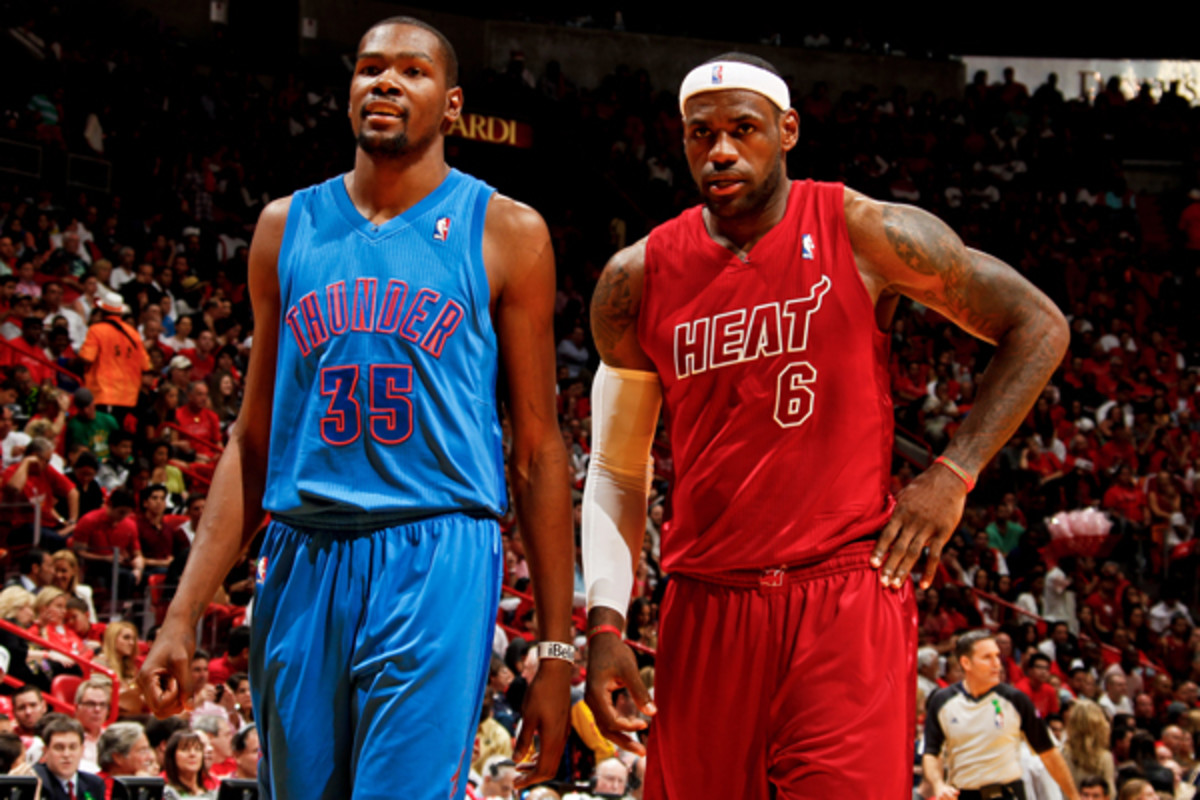
LeBron James (right) and the Heat beat Kevin Durant's Thunder on Christmas. (Issac Baldizon/Getty Images)
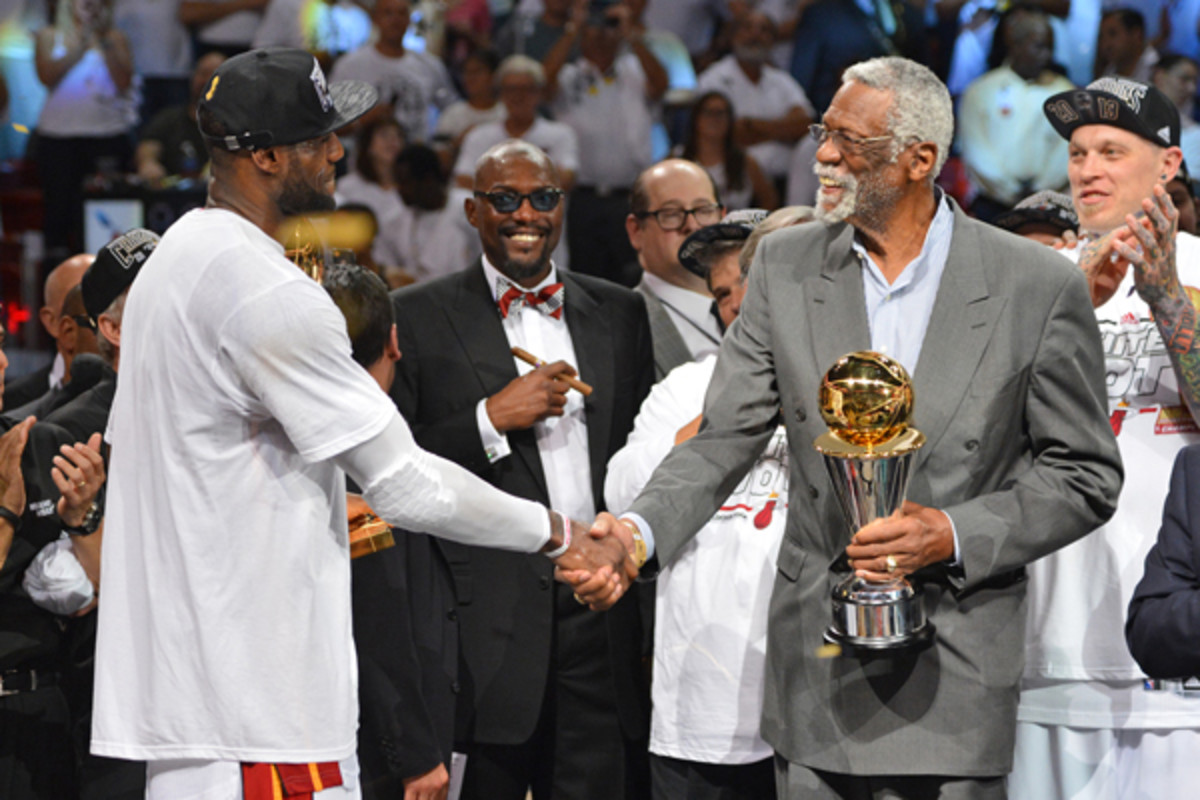
LeBron James (left) received his second straight Finals MVP award from NBA legend Bill Russell. (Jesse D. Garrabrant/Getty Images)
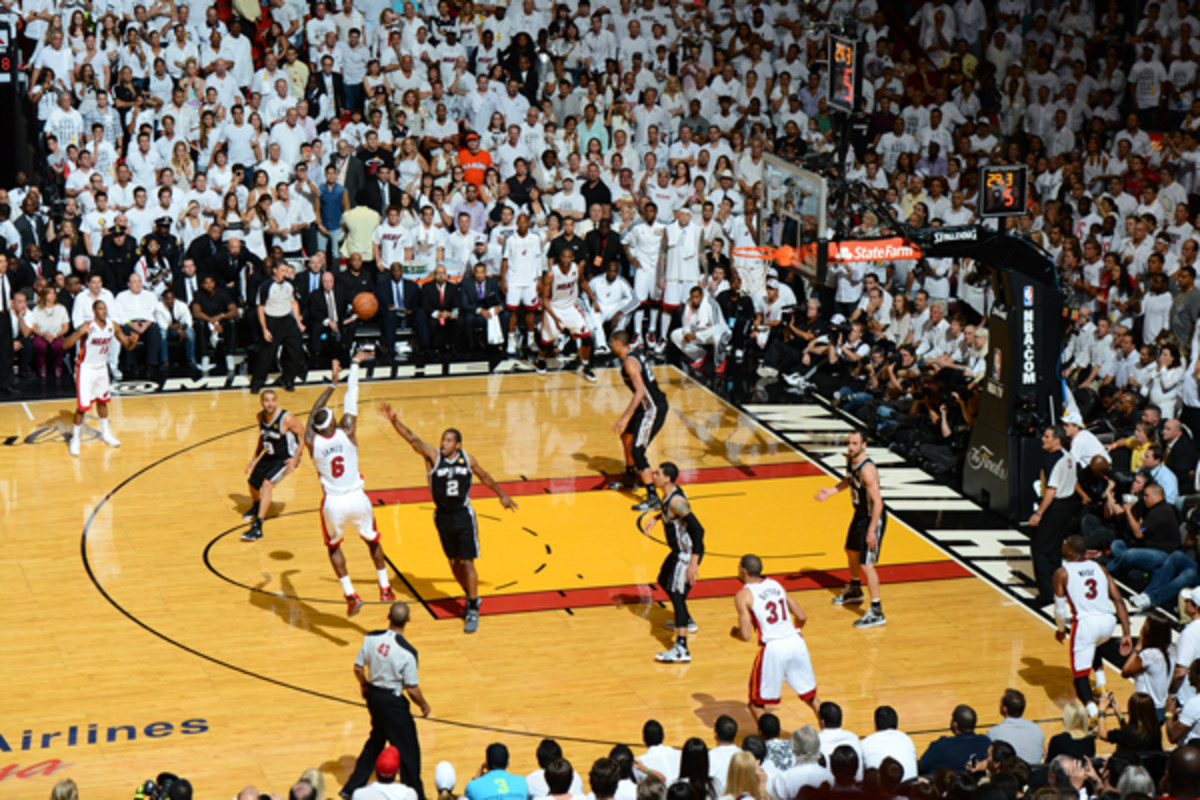
LeBron James (left) hit a key late jumper in Game 7 of the Finals against the Spurs. (Garrett Ellwood/Getty Images)
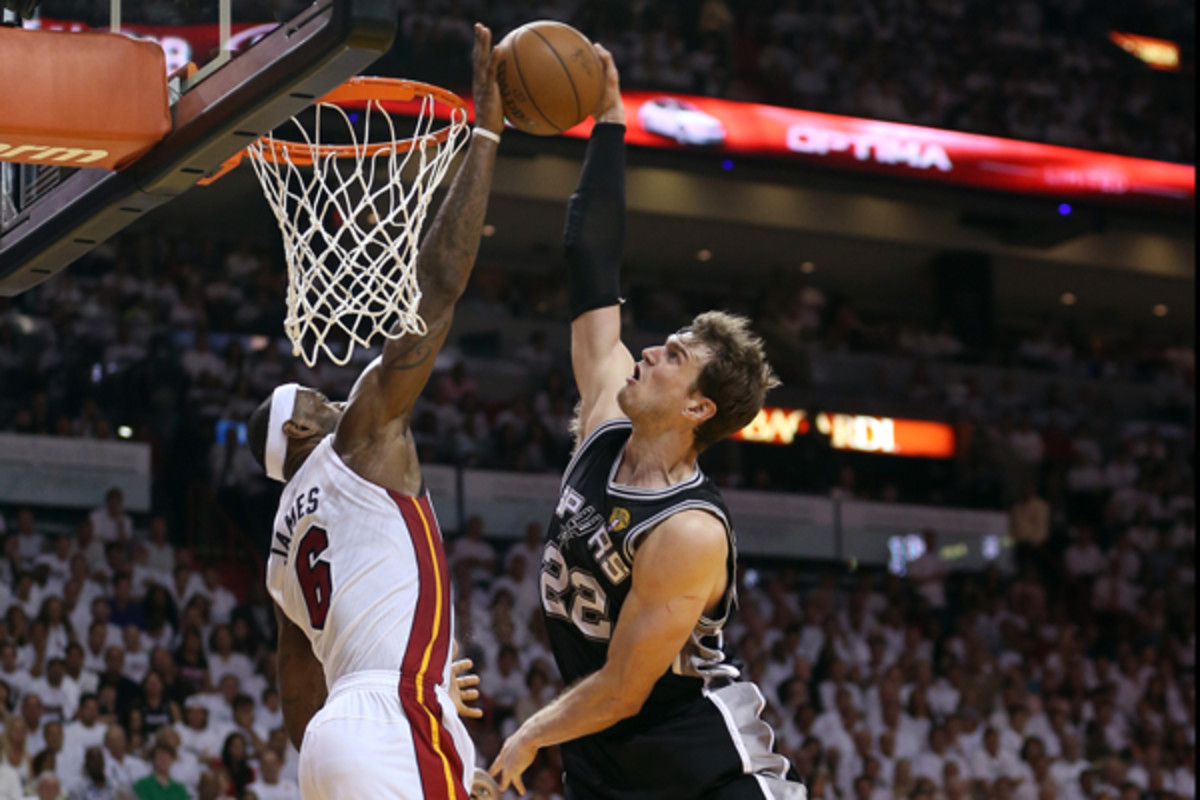
LeBron James (left) blocked Spurs center Tiago Splitter at the rim during Game 2 of the Finals. (Christian Petersen/Getty Images)
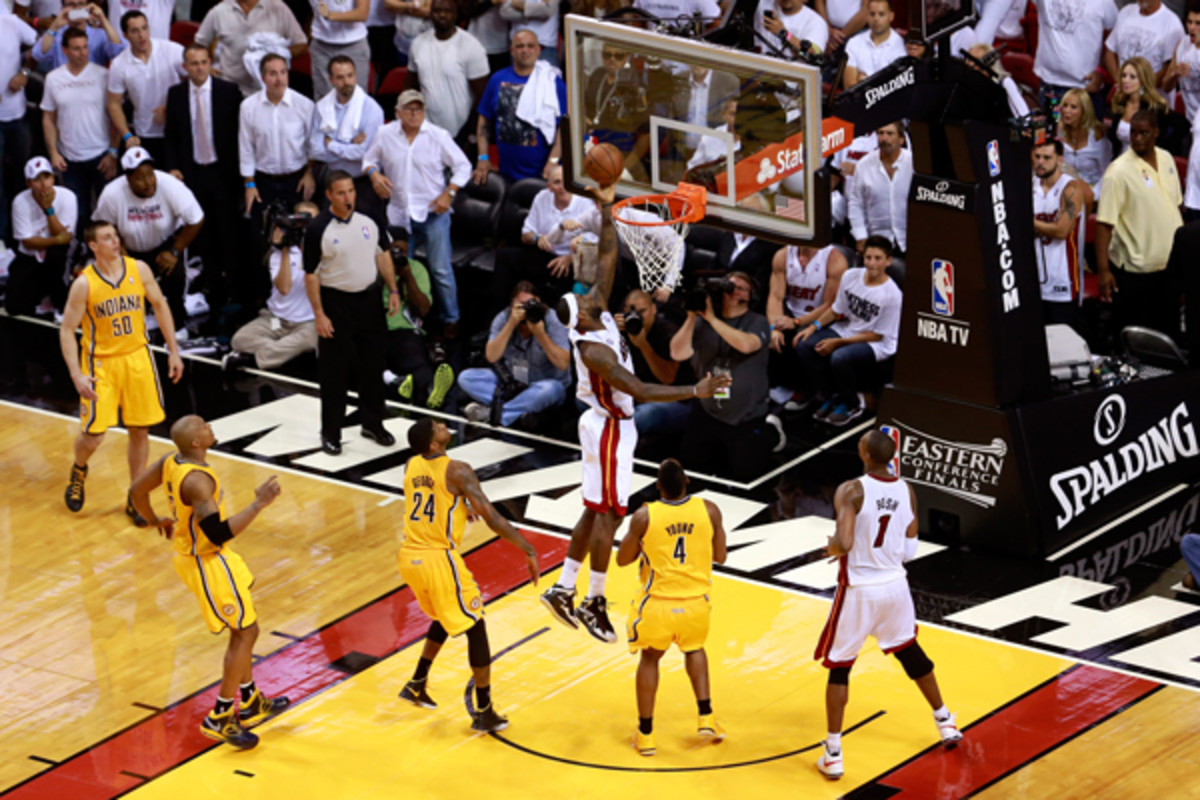
LeBron James (center) made the winning lay-up in overtime to defeat the Pacers in Game 1 of the conference finals. (Chris Trotman/Getty Images)
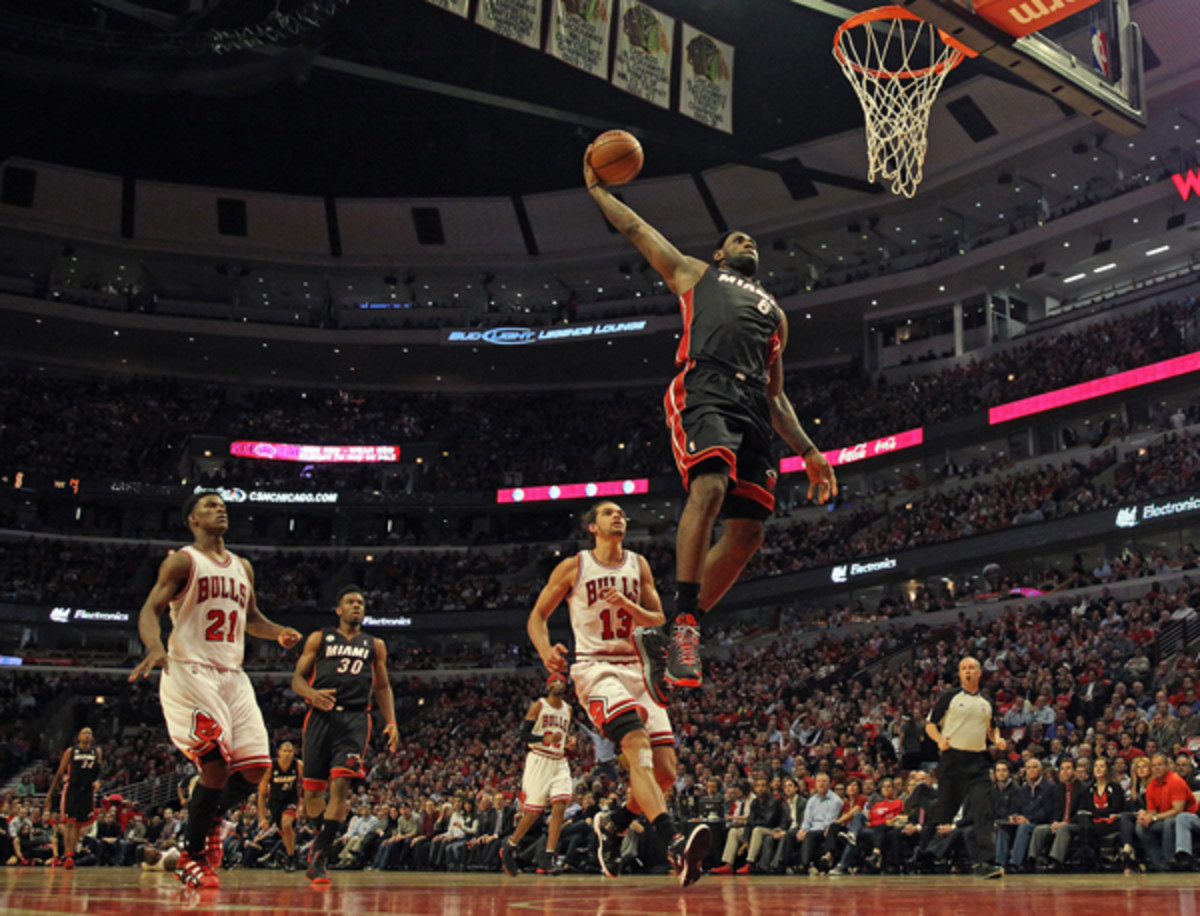
LeBron James (right) and the Heat eliminated the Bulls from the conference semifinals in five games. (Jonathan Daniel/Getty Images)
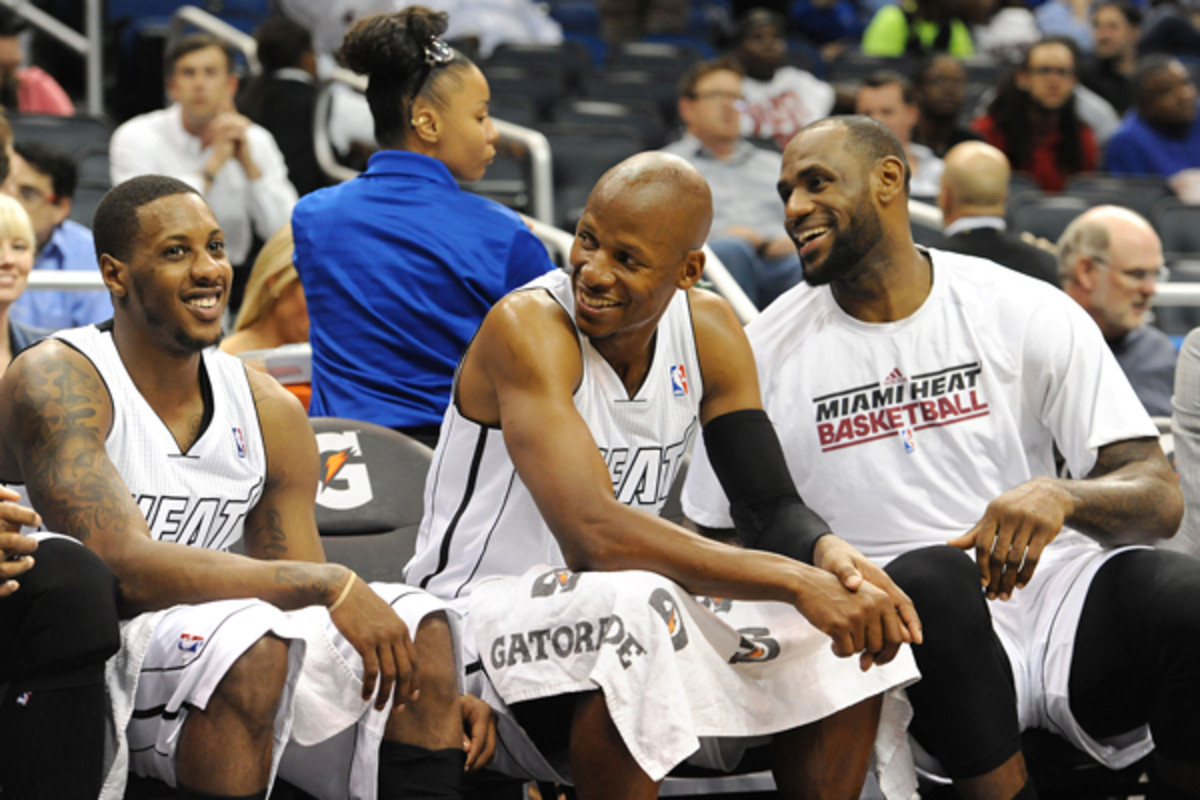
LeBron James (right) and the Heat celebrated their 27th straight victory when they defeated the Magic on March 25. (Gary Bogdon /Getty Images
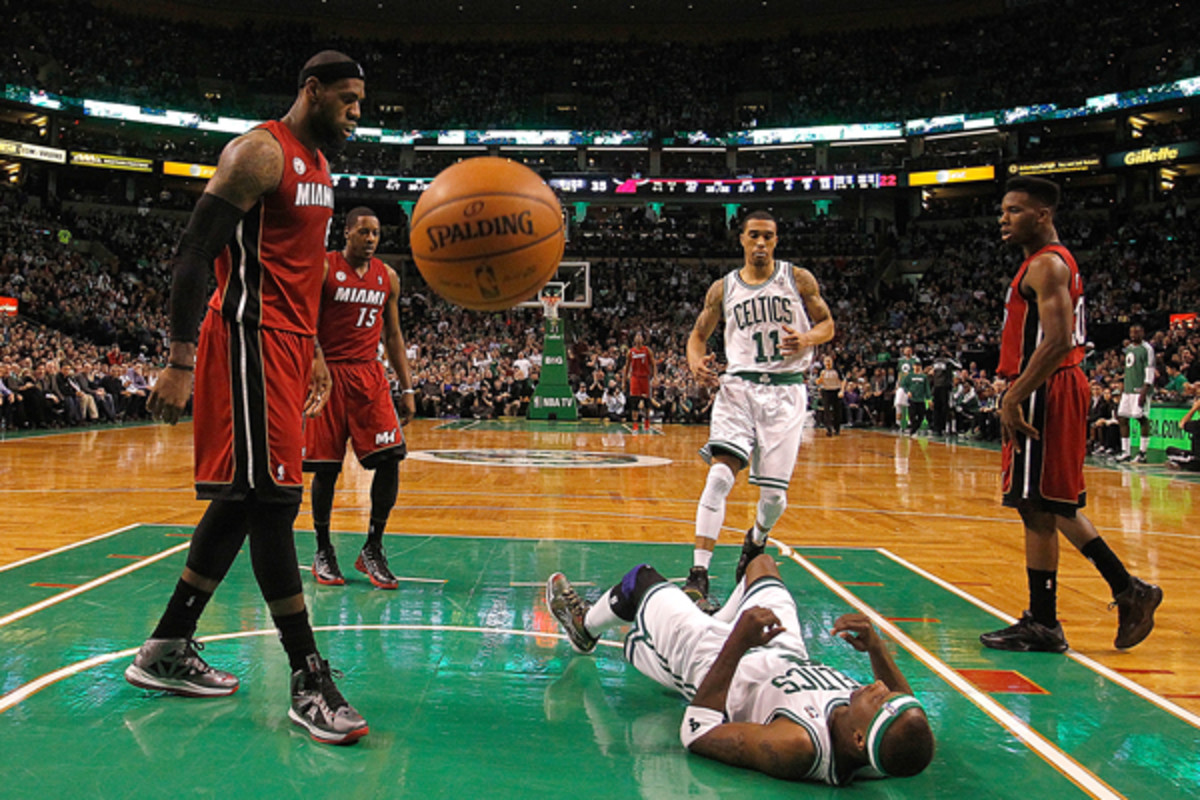
LeBron James (left) leveled Celtics guard Jason Terry with a vicious poster dunk. (J Rogash/Getty Images)
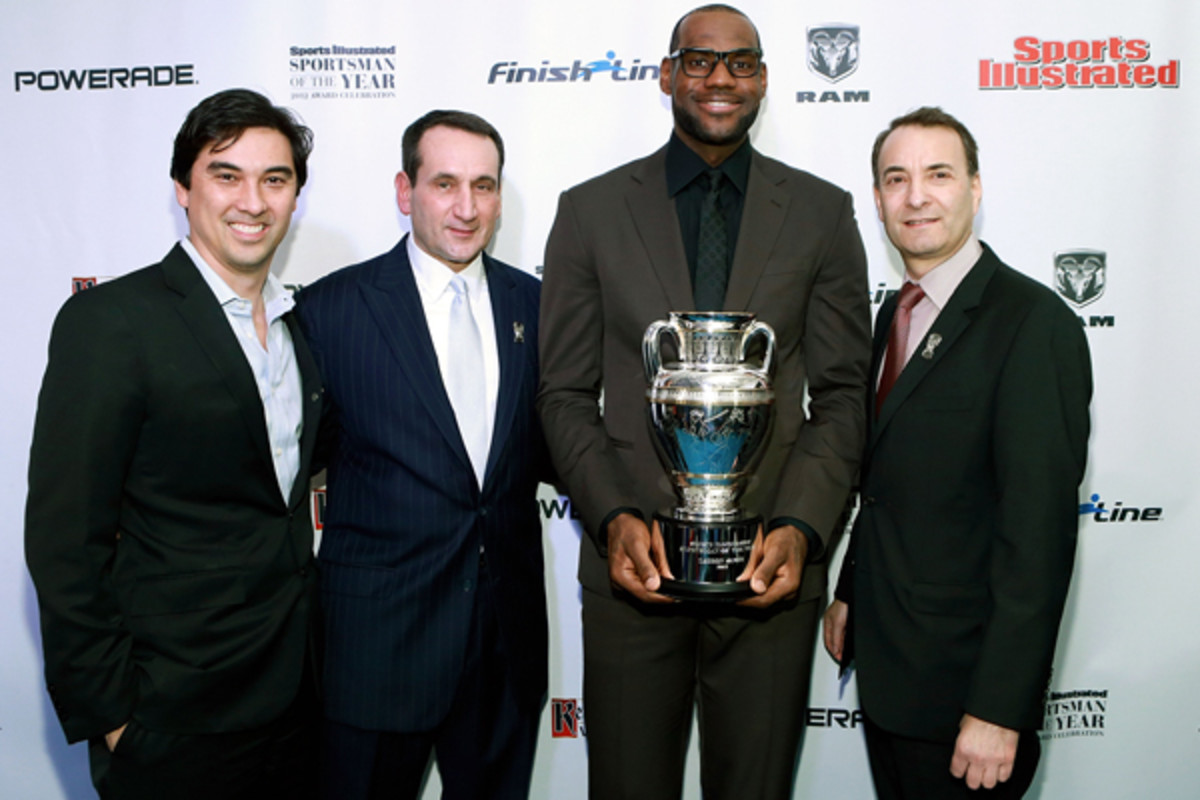
LeBron James (third from left) was named Sports Illustrated's 2012 Sportsman of the Year. (John Lamparski/WireImage)
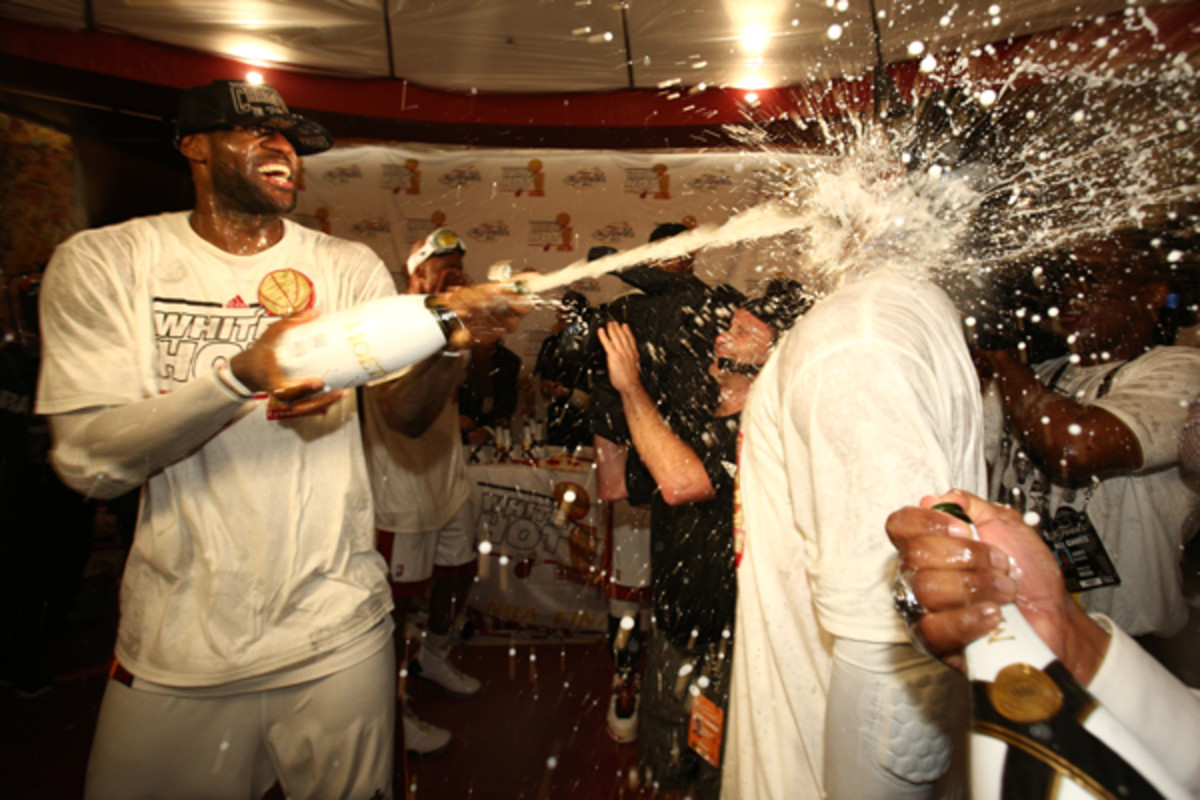
LeBron James (left) celebrated his second career championship with some champagne. (David Alvarez/Getty Images)
http://youtu.be/mE295ggKbHU
Statistical support for this post courtesy of Basketball-Reference, NBA.com and Jeremias Engelmann.
RANK | PLAYER | POSITION, TEAM |
|---|---|---|
100. | Nikola Vucevic | |
99. | Jarrett Jack | |
98. | Kyle Korver | |
97. | Matt Barnes | F, Los Angeles Clippers |
96. | Danny Green | G, San Antonio Spurs |
95. | Eric Bledsoe | G, Phoenix Suns |
94. | Chandler Parsons | F, Houston Rockets |
93. | Ricky Rubio | |
92. | Shawn Marion | |
91. | Brandon Jennings | |
90. | ||
89 | ||
88. | Goran Dragic | G, Phoenix Suns |
87. | Derrick Favors | F, Utah Jazz |
86. | Vince Carter | G, Dallas Mavericks |
85. | Amar'e Stoudemire | F, New York Knicks |
84 | Amir Johnson | |
83. | J.R. Smith | G, New York Knicks |
82. | J.J. Redick | G, Los Angeles Clippers |
81. | G, Toronto Raptors | |
80. | Lou Williams | G, Atlanta Hawks |
79. | George Hill | |
78. | Jeff Teague | G, Atlanta Hawks |
77. | O.J. Mayo | |
76. | Jamal Crawford | G, Los Angeles Clippers |
75. | Kenneth Faried | |
74. | Tiago Splitter | C, San Antonio Spurs |
73. | Kevin Martin | G, Minnesota Timberwolves |
72. | Danny Granger | F, Indiana Pacers |
71. | Carlos Boozer | F, Chicago Bulls |
70. | Jose Calderon | G, Dallas Mavericks |
69. | Omer Asik | C, Houston Rockets |
68. | Monta Ellis | G, Dallas Mavericks |
67. | Gordon Hayward | F, Utah Jazz |
66. | Anderson Varejao | C, Cleveland Cavaliers |
65. | Tyreke Evans | G/F, New Orleans Pelicans |
64. | Rudy Gay | F, Toronto Raptors |
63. | C, Detroit Pistons | |
62. | Thaddeus Young | |
61. | Ersan Ilyasova | F, Milwaukee Bucks |
60. | Andrew Bynum | C, Cleveland Cavaliers |
59. | Joe Johnson | |
58. | Nene | |
57. | Ryan Anderson | F, New Orleans Pelicans |
56. | Manu Ginobili | G, San Antonio Spurs |
55. | Luol Deng | F, Chicago Bulls |
54. | Steve Nash | G, Los Angeles Lakers |
53. | DeMarcus Cousins | |
52. | Greg Monroe | F, Detroit Pistons |
51. | Nicolas Batum | |
50. | Nikola Pekovic | C, Minnesota Timberwolves |
49. | Andrei Kirilenko | F, Brooklyn Nets |
48. | Jrue Holiday | G, New Orleans Pelicans |
47. | G, Portland Trail Blazers | |
46. | David Lee | F, Golden State Warriors |
45. | Danillo Gallinari | F, Denver Nuggets |
44. | Al Jefferson | C, Charlotte Bobcats |
43. | Larry Sanders | F/C, Milwaukee Bucks |
42. | Ty Lawson | G, Denver Nuggets |
41. | F, New Orleans Pelicans | |
40. | John Wall | G, Washington Wizards |
39. | Mike Conley | |
38. | Paul Millsap | F, Atlanta Hawks |
37. | F, San Antonio Spurs | |
36. | Pau Gasol | F, Los Angeles Lakers |
35. | Zach Randolph | F, Memphis Grizzlies |
34. | Josh Smith | F, Detroit Pistons |
33. | Andre Iguodala | G/F, Golden State Warriors |
32. | Paul Pierce | F, Brooklyn Nets |
31. | David West | F, Indiana Pacers |
30. | Brook Lopez | C, Brooklyn Nets |
29. | Serge Ibaka | F, Oklahoma City Thunder |
28. | Kevin Garnett | F, Brooklyn Nets |
27. | Tyson Chandler | C, New York Knicks |
26. | Rajon Rondo | |
25. | Paul George | F, Indiana Pacers |
24. | Deron Williams | G, Brooklyn Nets |
23. | Roy Hibbert | C, Indiana Pacers |
22. | Al Horford | C, Atlanta Hawks |
21. | Joakim Noah | C, Chicago Bulls |
20. | G, Cleveland Cavaliers | |
19. | Blake Griffin | F, Los Angeles Clippers |
18. | LaMarcus Aldridge | F, Portland Trail Blazers |
17. | Chris Bosh | F, Miami Heat |
16. | Dirk Nowitzki | F, Dallas Mavericks |
15. | G, Golden State Warriors | |
14. | Marc Gasol | C, Memphis Grizzlies |
13. | Kevin Love | F, Minnesota Timberwolves |
12. | Derrick Rose | G, Chicago Bulls |
11. | James Harden | G, Houston Rockets |
10. | Carmelo Anthony | F, New York Knicks |
9. | Kobe Bryant | G, Los Angeles Lakers |
8. | Dwyane Wade | G, Miami Heat |
7. | Dwight Howard | C, Houston Rockets |
6. | Tim Duncan | F/C, San Antonio Spurs |
5. | Russell Westbrook | G, Oklahoma City Thunder |
4. | Tony Parker | G, San Antonio Spurs |
3. | Chris Paul | G, Los Angeles Clippers |
2. | Kevin Durant | F, Oklahoma City Thunder |
1. | F, Miami Heat |
